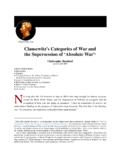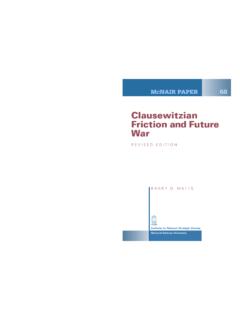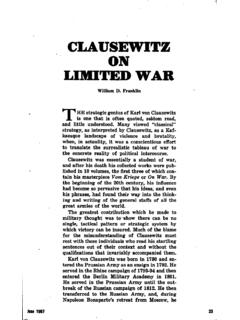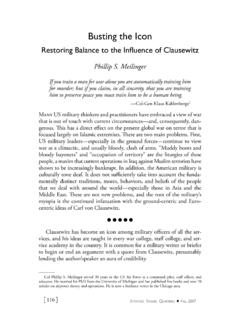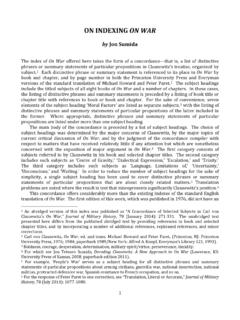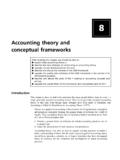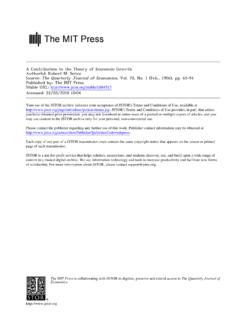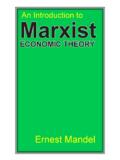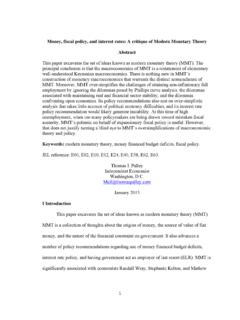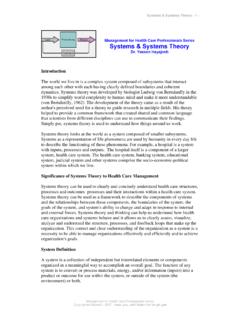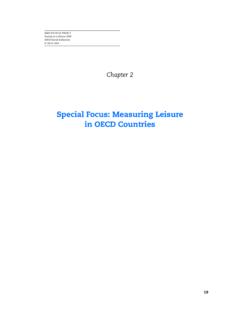Transcription of Strategic Theory and the History of War
1 Strategic Theory AND THE History OF WARDANIEL MORANNAVAL POSTGRADUATE SCHOOL Introduction: The Organization of Violence The Art of War in the Age of Reason Clausewitz and the Modernization of War Beyond the Battlefield: Sea Power Imagining Armageddon: Air Power Total War, People s War, and the Crisis of Theory Copyright Daniel Moran, 2001. All rights essay surveys the development of Strategic the-ory from its emergence in the seventeenth century throughthe era of the world wars. Although the focus is on ideas,some account is taken of changing historical circumstancesagainst which Strategic thought has unfolded. The goal oftheory in any field is to improve our understanding of re-ality, and our ability to act effectively. In the case of stra-tegic Theory , the interaction between thought and action isespecially intense, because war is such an unforgiving en-terprise, and because, until recently, serious thinking abouthow war should be conducted has been confined for themost part to those responsible for waging it.
2 Before theadvent of nuclear weapons, the work of Theory in the mili-tary field was almost exclusively the concern of practitio-ners. Most have proceeded by way of historical inference,scrutinizing recent (and occasionally remote) experience insearch of an underlying logic capable of explaining result is a body of work displaying substantial intel-lectual continuity, despite much intervening technologicaland social change; but one whose basic outlook wouldeventually be called into question by the advent of nuclearweapons on the one hand, and by the rising prominence ofguerilla insurgency, terrorism, and other forms of irregularwarfare on the : The Organization of ViolenceStrategic Theory is the branch of social Theory con-cerned with the use of force to achieve the goals of onecommunity in conflict with others. It aims at a systematicunderstanding of how to employ armed forces to advancepolitical, social, economic, cultural, or ideological inter-ests. War s instrumental nature its logical and practicalsubordination to objectives outside itself is in theoreticalterms its most important characteristic.
3 The first step instrategic analysis, as Napoleon said, is to ask What is thewar about? Absent an answer or, alternatively, if theproposed answer is Nothing war becomes a maze ofatavistic bloodshed that can only be discussed in technicalterms. It is because war is an organized social enterprisethat strategy, which is the calculated application of collec-tive violence for some ulterior purpose, becomes both pos-sible and most famous assertion of war's status as a meansoccurs in Carl von Clausewitz's On War, where war isidentified as a political instrument, a continuation of po-litical activity by other means politics being defined,elsewhere in the same work, as the trustee and repre-sentative of all the interests of the community. 1 It must beemphasized, however, that Clausewitz's originality as atheorist does not derive from his identification of war as apolitical instrument, but rather from his insistence thatpolitics permeates all levels of military action.
4 In itself, thenotion that war is a function of politics was already com- 1 Carl von Clausewitz, On War, edited and translated by MichaelHoward and Peter Paret (Princeton, 1976), 87, , as symbolized by the practice, popularized byCardinal Richelieu (1585-1642), of casting the words Ul-tima Ratio the final argument into the barrels ofcannon. This view of war has predominated throughout themodern era: war is the final argument of kings, as Rich-elieu would have said; and if there are no kings, then ofstates and of what is worth noting about this idea is howeasily its acceptance can relegate war to the margins ofpolitical Theory . War does not loom large in the work ofJohn Locke, or Montesquieu, or David Hume, or JohnStuart Mill, or (with some qualification) Karl Marx. On thecontrary, the dominant issue in Western political thoughthas always been how to organize and legitimize powerwithin communities. That such communities would fightwith each other was obvious, but difficult to grasp analyti-cally, because the contest was so chaotic.
5 Most writerswere content to follow Locke (and Thomas Hobbes beforehim) in envisioning the international arena as akin to thestate of nature, lacking, in Locke's parlance, a commonjudge whose authority was recognized by Warserved as a place-holder for the missing judge. At the sametime, its cruel and arbitrary character illustrated what lifeoutside organized politics was like. When Clausewitzwrote in the 1820s that the natural element of war waschance, he was to some extent echoing a well-establishedunderstanding of where war fit into the larger scheme reasons why governments and individuals mightventure into the chaos of war have always been subject tomoral scrutiny. The literature on the justice of war, and ofjust conduct in war, is both more extensive and more im-pressive intellectually than that on how war can be foughtmost effectively. Questions of justice and morality haveimpinged but little upon Strategic Theory , not becausemilitary theorists are necessarily indifferent to humanity,but because such external forces lie beyond the scope oftheir must be recognized that Napoleon s question, how-ever useful as a starting-point, is deceptive in suggestingthat, once war s purposes have been identified, its realitybecomes easier to grasp.
6 This is only marginally , for instance, What is Hamlet about? There isno reasonably direct reply to this question revenge, maybe, or betrayal that will not strike anyone familiarwith Shakespeare s play as na ve. Knowing that Hamletfeels betrayed, and is bent upon revenge, explains only asmall number of his actions, and then only partially. Ham-let s fate is determined by psychological and culturalforces that are remote from his conscious purposes, andbeyond his cognitive reach or Shakespeare s, for that 2 John Locke, Second Treatise of Government [1689-1704],chapter 3: Of the State of War, in Two Treatises of Govern-ment, edited by Peter Laslett, 2nd ed. (Cambridge, 1967), : Strategic Theory AND THE History OF WAR2matter, though Shakespeare s knowledge of Hamlet mustbe as close to God-like as one can the end, the question What is Hamlet about? ismore likely to inspire an impatient groan than a firm an-swer.
7 War is much the same, decidedly so in the case ofintense or protracted conflicts whose effects react uponsociety as a whole. As in Hamlet, most of what happens inwar is driven by unique or contingent circumstances: cul-tural or institutional preferences, economic resources, geo-graphic facts, ethnic animosities, and so on, many of whichare poorly understood by the participants. The ability oftheory to explain or incorporate such influences is are any number of instances in which it is perfectlyclear that a belligerent s strategy arises directly from itsmilitary capabilities, refracted by habit: as often as not,you just do what you can, regardless of what course ofaction may be deemed optimal in , the impact of Theory upon practice has not beennegligible, either. Although writers on war are sometimestoo ready to impute exaggerated importance to books asif senior commanders or, indeed, whole nations, have al-tered their military outlook as a consequence of readingClausewitz or Mahan the tendency of modern militaryorganizations to resemble each other testifies to the or-ganizing power of ideas.
8 The contemporary armies of (totake a few representative examples) China, France, Brazil,Egypt, and the United States, all resemble each other morethan they do the armies of their ancestors because, despiteall cultural differences, they share a common understand-ing of the basic character and use of military force. Thatunderstanding is rooted in intellectual developments thatoccurred in Europe and America over the last three hun-dred force structures, weapons systems, and fightingmethods of good armies in the seventeenth century theperiod when the systematic study of war first gains impor-tance were markedly more diverse and idiosyncratic thanthey would be later on. A number of factors contributed tothis convergence, including the development of new tech-nologies, and the progressive social and economic integra-tion of Europe (and, eventually, of its colonial hinterlands).The exemplary achievements of France during the Revo-lutionary and Napoleonic Wars (1792-1815) and of Prussiaduring the Wars of German Unification (1864-71) alsoplayed a part, by establishing models of military excel-lence for others to emulate.
9 Yet it is also true that by thenthe soldiers of the leading powers were already learning tothink about war along recognizably similar lines; and,moreover, that the profession of arms had come to implynot just personal courage and the right social position, butdistinctive intellectual Art of War in the Age of ReasonBy the turn of the twentieth century, Western armieshad arrived at a common Strategic vision that, subject tomodification in detail, would endure through the SecondWorld War. At its center lay a map, on which great armiesmaneuvered against each other. All sought the same basicend: to concentrate strong forces against weaker ones, byexploiting favorable terrain, or by striking the enemy at aplace where he was inherently (or inadvertently) weak, orat a time when he was poorly possibilities were thought to exist even betweenwell-matched opponents because everything that fights onland, from the individual soldier to the army of which he isa part, is stronger on its front than on its flanks and rear;stronger when it has its feet under it than when it is mov-ing to a new position; and dependent upon logistical andcommunications links that grow more vulnerable and lessefficient in proportion to their length.
10 Strategy was essen-tially a search for advantage among these facts. It was rec-ognized that, given the firepower of modern armies, plusthe fact that all of them operated according to similarmethods, the likely result of combat between them wasstalemate, or perhaps some modest territorial gain, shouldone side manage to drive back the other. True victory,however that is, victory capable of deciding great politi-cal questions required that the enemy s forces be not justrepelled or reduced, but destroyed. Achieving this sort ofsuccess was a matter of high professional skill, to whichcivilians could make no contribution, either as politicaloverseers, or as irregular combatants, whose military po-tential and legal rights were held in equal Strategic consensus derived from the systematicstudy of war that began in the wake of the early-modernscientific revolution. War had, of course, been a subject ofintense thought since long before then. Any number ofworks handed down from antiquity the Iliad of Homer,the histories of Thucydides, Tacitus, and Josephus,Ceasar s Commentaries had treated war with much in-sight.

